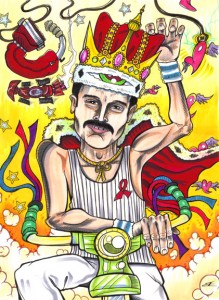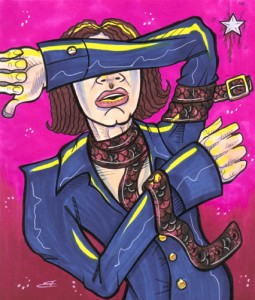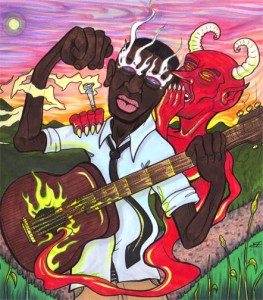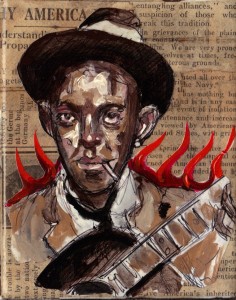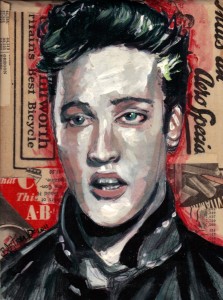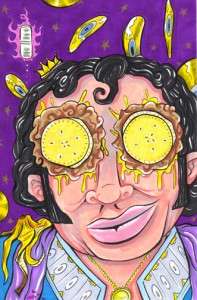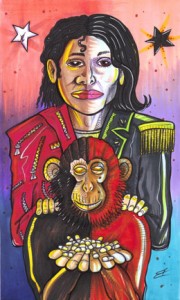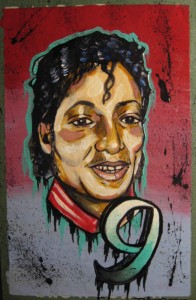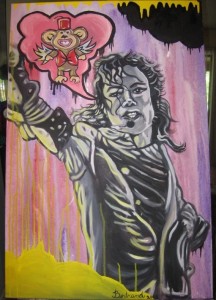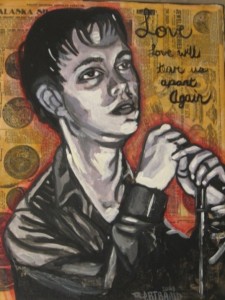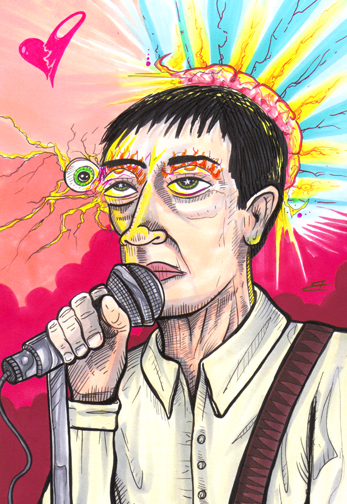You call Freddie a faggot. You think his mustache was pure trash. You are disgusted by the glans flexed in his spandex. You dig into the details of Mercury’s mercurial libido, but I’ll tell you right now that being that concerned about a rock star’s sex life is fucking gay, man. Vicarious hairy ass.
You fantasize about the sloppy meat between a superstar’s sheets like an imaginary groupie choking on phantom fellatio. You feed on rumors like a junky at a pain clinic fire sale. You’re a bottom-feeder sniffing at the hem of a musical Messiah’s garment, cowering in the shadows of his ball sack. Not only would Freddie Mercury not fuck you, he wouldn’t be flattered that you care who he fucked. So call him a faggot if you want to. No one denies he was gay—he was the frontman for QUEEN, for Chrissakes. He just wasn’t as gay as you are.
That doesn’t mean that Mercury never slept with women. Men don’t grow mustaches like that and not get down with the ladies at some point. He probably had a hundred women, which is ninety-nine more than you will—if we count self-administered handjobs, anyway.
Reading through the quotes in Freddie Mercury: His Life in His Own Words, it becomes clear that the singer was passionate about women, especially the only love of his life, Mary Austin.
“I’m gay as a daffodil, dears. But I couldn’t fall in love with a man the way I could with a girl…”
“I treat Mary as my common-law wife and we’re getting on fine…We believe in each other, so fuck everybody else.”
Maybe fucking everybody else was the problem, because Freddie certainly did a lot of that—men, women, midgets, wombats, God only knows what else, who cares? It’s none of your business. Stop snooping.
After seven years of living together, he and Mary called it quits. But Freddie would carry on (carry oooon…) because nothing really matters…
“Sometimes a good friend is much more valuable than a lover. Apart from Mary, I don’t have any real friends.”
I’m sure his buddies didn’t appreciate that, and you can be damn sure that his hairdresser and lover of over a decade wore a squished up sour face after hearing it. Jim Hutton lived with Mercury for the last six years of his life, remaining by his bedside like a loyal pet, and yet Freddie had the gall to say: “If I go first, I’m going to leave everything to [Mary Austin]. Nobody else gets a penny—except my cats.” And Freddie followed through, like a true-to-life, thuper thweet, find-em-fuck-em-and-give-em-AIDS rock star. Freddie lived life on his own flamboyant terms. Fuck everybody else.
Yeah, Freddie performed at Bob Geldof’s globally-broadcast, egalitarian charity ball in 1985. But Freddie didn’t get guilt-tripped into doing Live Aid. Those starving Ethiopians couldn’t piss on his fabulous parade. Causes are so gay. No, he played Live Aid because playing the biggest humanitarian concert of the century is just sooo Freddie Mercury.
“To be honest, let’s face it, all us rock stars still want to be in the limelight and this is going to showcase us. Let’s be open about it…it’s going to be a worldwide audience, an all over simultaneous broadcast…I doubt there is one artist that’s going to appear who hasn’t realized that fact…
“Even if I didn’t do it, the poverty would still be there. It’s something that will always be there. We’ll do all we can do to help because it’s a wonderful thing. But as far as I’m concerned, I’m doing it out of pride.”
It was all about entertainment. Left wing musicians hauling millions off to their mansions or right wing writers peddling psuedo-empowerment to the servant classes—Mercury was beyond such hypocrisy and pretention. Having a message is for fags.
“We think a show should be a spectacle and we’ve been slagged off in the press for our flamboyant stage show. But that’s the whole point…
“I feel incredibly strong on stage…The adrenaline’s there, you feel like the devil and it’s wonderful, absolutely wonderful. But I know in myself that I would never misuse it…I’m much too wonderful for that, darlings!”
Mercury’s honest appraisal of his exalted status was refreshing to realistic rock fans. This was an age that viewed the martyrdom of John Lennon as a precursor to a cultural apocalypse, a generation bred to worship anyone with a TV face and a microphone. Mercury was a shallow breath of fresh air.
“I’m not the Messiah or anything—I don’t want to preach to [the audience]…My job is not to teach them, my job is to make music. I don’t want to change their lives overnight, I don’t want to involve the audience in peace messages or anything like that. It’s escapism…”
Queen was the rare result of talent, will, and greed. They crafted songs with the care of a jeweler cutting a diamond, producing both snappy hits and epic ballads. The audience could never be too big, the lights could never be too bright, the showmanship could never be too superficial.
“I was once thinking of being carried on stage by Nubian slaves and being fanned by them…But where to find a Nubian slave?”
Freddie wasn’t about to take himself too seriously. He was all laughter and leather. Topless tarts and bottomless mic stands. Macho men and mustaches. Overbites and undergarments. White tights and spotlights. Like fat bottom girls, he made the rockin’ world go round.
It made him miserable in the end. He became distrustful of the hanger-on hobnobbers who slipped into his life just to slurp on his fame like psychic vampires fighting over an infected used tampon.
Freddie had risen to the height of social approval and material wealth. He had an eight-bedroom Victorian-style mansion built in Kensington, West London. Marble floors and mahogany staircases. Shopping sprees to Harrods, Cartier, and Asprey. Lalique and Galle vases. Midgets serving trays of cocaine. You couldn’t attract more rats with all the cheese in Wisconsin.
“It’s like I’m handicapped, because people immediately go for my so-called stage persona. No one loves the real me. Inside, they’re all in love with my fame and stardom.”
Freddie became more and more emotionally isolated and shackled by the cold chains of betrayal. He trusted no one further than he could smack them with his cock, so that wound up being the only personal connection he could hope for. The sad part is, his sordid love life is all you ass-hammers even care about.
“My sex drive is enormous. I sleep with men, women, cats—you name it. I’ll go to bed with anything! My bed is so huge it can comfortably sleep six.”
Does that titillate you? Captivate you? Are you happy now that you’ve had a peek beneath his sheets? I’ll bet you want to know who now. What are their names? What positions did he prefer? What did his lovers look like? What did they smell like? Did their wiry mustaches ever get stuck together like velcro?
You ask too many questions, and Freddie was never one for answering questions, anyway. Questions are fucking queer. In the last years of Freddie’s life, people were always asking probing personal questions. Why doesn’t he play shows anymore? What happened to the wild parties? Why does he look so unhealthy? Is he love sick? On drugs? HIV positive?
Freddie had nothing to say about it. He became somewhat reclusive. He “stopped having sex and started growing tulips.” The clock ticked by slowly. Inquiring minds wanted to know.
Then suddenly, on November 23, 1991, Mercury came clean with a public statement that he indeed had AIDS. A thousand gay assholes simultaneously slammed shut in abject terror. The next day, Freddie was dead.
I know, I know, you say he got what he deserved. Promiscuity leads to decadence. The wages of sin is death. Sodomy causes pain in the end. God hates fags. And maybe you’re right. AIDS is a nasty way to go, generally reserved for certain proclivities, so that has to mean something. Ask yourself this, though:
If God kills queers because he hates their man-loving ways, and none of us live forever, then does God hate us all, each for our own special reasons?
Death cuts every one of us down, but life only raises up so many rock heroes. How ironic that Freddie Mercury became one of the brightest stars in the world because he was so fantastically flaming, and yet you’ll just sneer from the sidelines because you’re so fucking gay.
[In memory of Seth Putnam]
© 2011 Joseph Allen
Queen — “Another One Bites the Dust”
1981
